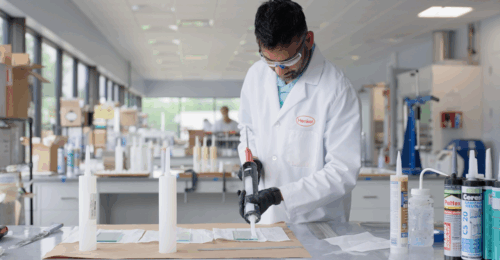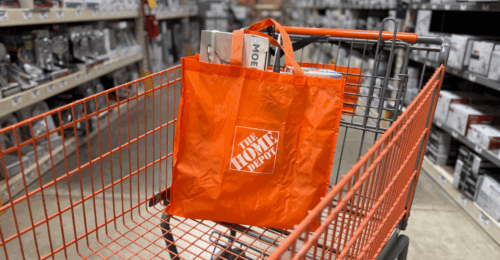In the last four years, home gardening has grown so much in popularity that more than half of American households now garden. This hobby has become a whole new industry of people not only growing better-looking landscaping, but also growing their own food – specifically, organic food. Organic food sales in the U.S. almost doubled from 2013 to 2022. Between 2000 and 2021, organic-certified land in the U.S. for growing organic crops or livestock nearly tripled – increasing from 1.8 million acres in 2000 to 4.9 million acres in 2021 according to the USDA.
Organic, healthier food is at our fingertips, whether growing tomatoes in a patio container or growing an entire row of tomatoes in the backyard. But how is organic gardening different from traditional gardening? Is there much of a difference? In this article, we will explain what organic gardening means and requires and provide tips on top organic products to help you grow healthy, organic fruits, vegetables and herbs. Whether you are a beginner or seasoned gardener, gardening in pots on your balcony or growing several plants in the ground, there is always more to learn with ever-evolving products.
Defining Organic Gardening
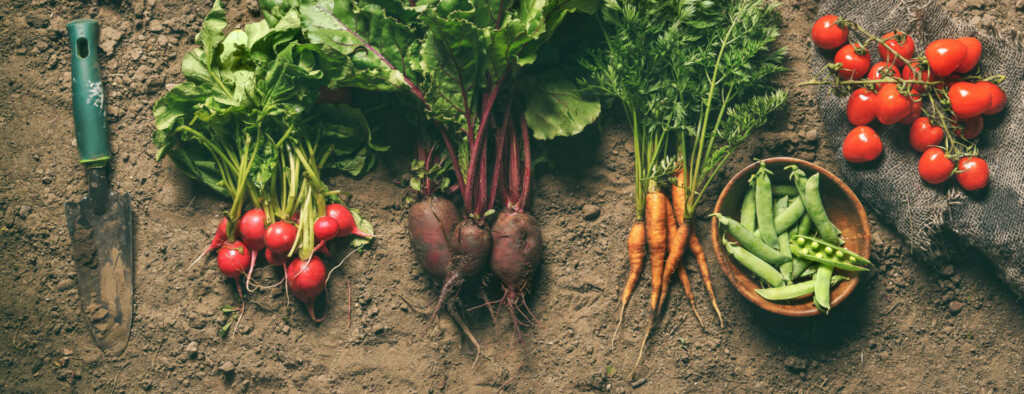
Organic gardening is merely gardening without synthetic ingredients. This means soils, composts, seeds, plants, plant foods, and pest controls that were made or grown using natural ingredients instead of synthetic chemicals, herbicides and pesticides. It often yields fruits, veggies and herbs that pack more flavor but requires a little more effort around weed and insect control.
Knowing When to Plant
We recommend you learn frost dates – these are the last predicted dates that the temperatures will be freezing or slightly above freezing, after which it is safe to plant your seedlings. The Almanac provides an interactive tool to narrow down frost dates by zip code and even lists ideal dates for specific plants. Be careful to watch your local weather, though, since frost dates are only estimates based on historical climate information.
The Importance of Good Dirt
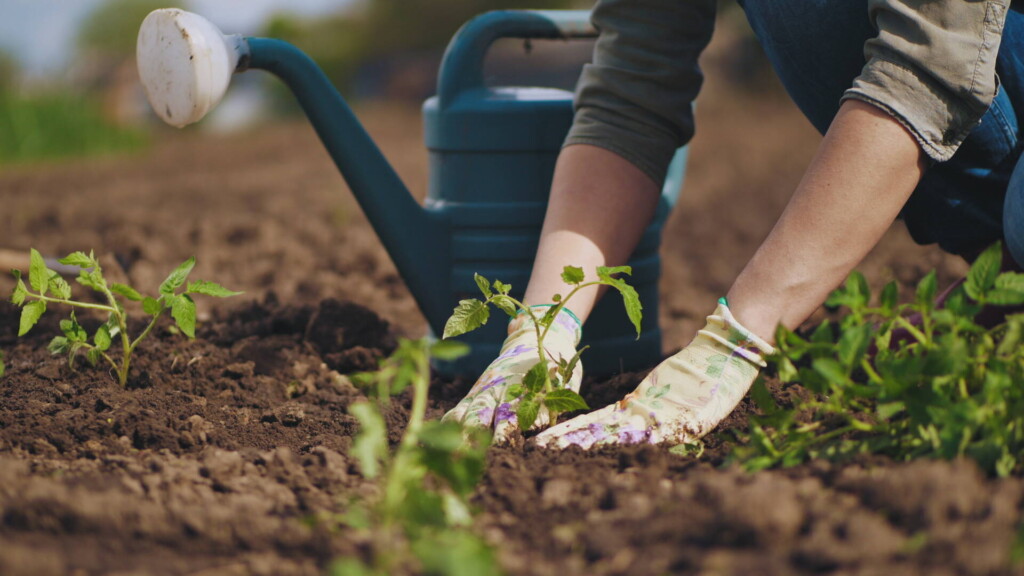
Good organic soil is the foundation of a healthy organic garden, and what makes it different is that it does not contain synthetic chemicals. Start your garden using plenty of organic soil, and you can always mix it with your existing soil if you are planting an in-ground garden. This helps diversify soil textures, which increases the likelihood of the soil draining properly – that is, not draining too quickly while leaving plant roots thirsty and stressed and not holding on to too much water while drowning roots. If you are not sure if the soil you want to use is organic, make sure the label says it is an organic soil or check for the OMRI label, which indicates the product has been certified by the Organic Materials Review Institute.
Adding compost to your soil mix will give your plants even more nutrients and beneficial microbes, whether they are in the ground or in a container. Black Kow compost is decomposed cow manure, which also helps balance the soil’s texture. If soil is too dense, roots will struggle to spread. But if soil is too sparse or sandy, roots will struggle to take hold and soak up nutrients for healthy plant growth. Instead of adding store-bought compost, you can make your own from fruit and vegetable food scraps, leaves and grass clippings – but be sure to never use animal products such as meat, bones or cheese. Making compost can take time, and this guide will walk you through how to compost if you want to start your own.
Plant Variety Is King
Planting seedlings is almost instant gratification, but starting plants from seeds can be very rewarding. Your local Home Depot store will carry seedlings and plants that grow well in your hardiness zone. Plant hardiness zones are also known as “growing zones” or “gardener’s zones” and inform us about which plants grow best in a specific region. The Home Depot offers several organic options if you decide to plant seeds. One of our seed suppliers, Back to the Roots, offers a full line of organic seeds. The company started by growing mushrooms from spent coffee grounds and has since expanded its organic products to various growing kits, packet seed, seed starter pots and soils. “Our seeds are exclusively grown on organic farms (without synthetic chemicals!) and cleaned/packed in certified-organic facilities. Our soils use no synthetic chemicals, additives or plastic-coated fertilizers. They are made from 100% organic and natural ingredients,” says cofounder Nikhil Arora.
Back to the Roots will be partnering with The Home Depot’s Kids Workshop on April 6th by donating more than half a million organic carrot seed packets. If you’d like to introduce your kids to organic gardening, this is a great opportunity. Plus, they’ll get to build a lattice planter!
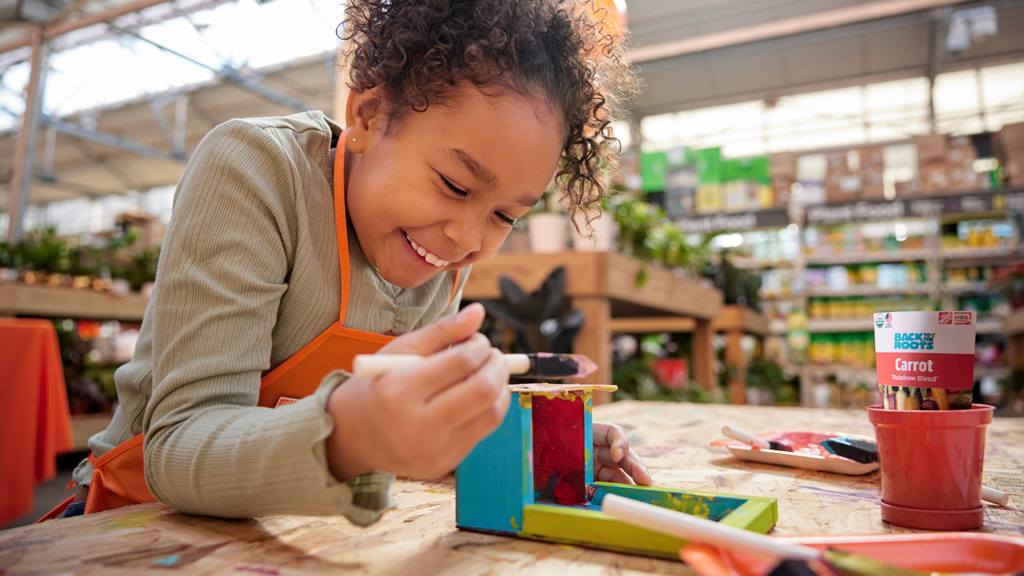
If you start your organic seeds indoors, be sure to follow the seed packet instructions on germination timing, as well as instructions from the Almanac on how to transplant them into your garden and give them the best chance at survival.
Once you are done planting, adding 1–2” of cypress mulch to your garden will help slow water evaporation in the heat of summer, which gives your plant roots more time to absorb nutrients from the soil.
Growing a variety of flowering plants contributes to a healthy garden. These may be fruits, herbs, vegetables or ornamental flowers that produce pollen in their blooms. Providing pollen for local insects like bees, butterflies, and dragonflies helps keep your local pollinator population healthy and active. Blooming plants will also attract beneficial insects like green lacewings and ladybugs that feed on pests like aphids, mites and slugs, which can destroy a garden. Our Water Our World is a partner of The Home Depot in the San Francisco Bay area and provides helpful guidance on which plants attract these good insects. A deep dive article contributed by Our Water Our World is on our Eco Actions site and provides more details about beneficial insects, as well as pests to remove from your garden.
Attracting beneficial insects into your garden is essential to avoid chemical pest control. But what if these insects are not getting the job done, and you still have pests? Let’s talk about insects and chemicals in an organic garden.
Pests in the Garden
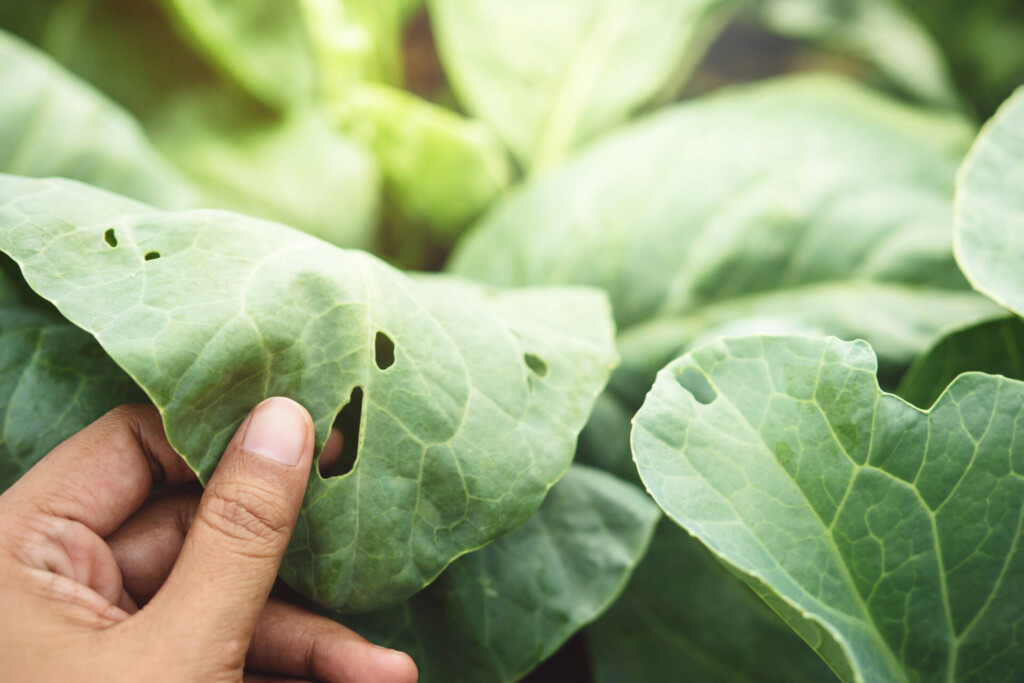
You will know if you have destructive pests in your garden because you will start seeing holes in leaves from pests feasting on your plants. These pests can quickly kill a plant, or at best prohibit it from producing fruit. Remember, maintaining an organic garden is all about avoiding chemicals, so consider removing pests by hand or spraying the garden with Neem Oil or Insecticidal Soap. Another option is Diatomaceous Earth for crawling insects. This powder is made from algae fossils that are ground into a fine powder. And although the powder is harmless to humans and animals, it is like shards of glass to small insects, damaging their exoskeletons as they move across it or ingest it. If you choose to use a chemical, be sure to follow spraying instructions and look for the OMRI label – this is the same Organic Materials Review Institute we mentioned above in the section on soil. OMRI certifies many products for organic gardening, including plant foods.
Plants Eat and Drink, Too
Once your garden is planted and growing, how do you ensure your plants stay healthy and thrive? Although you have started with good soil, your plants will still need supplements for nutrition. Add organic plant food to your garden soil as early as one month after planting and always be sure to water it in so it gets into the soil and down to the plant roots. Most organic plant foods get their nutrients from animal waste like chicken manure, bone or blood meal. A deep dive article into Vigoro organic plant foods provides helpful detail on why organic plant foods matter, and why Vigoro’s are changing the organic gardening game. One of the most popular and effective ways to feed your plants is with Earthworm Castings. This plant food is nontoxic, rich in nutrients and minerals, and a favorite among organic gardeners.
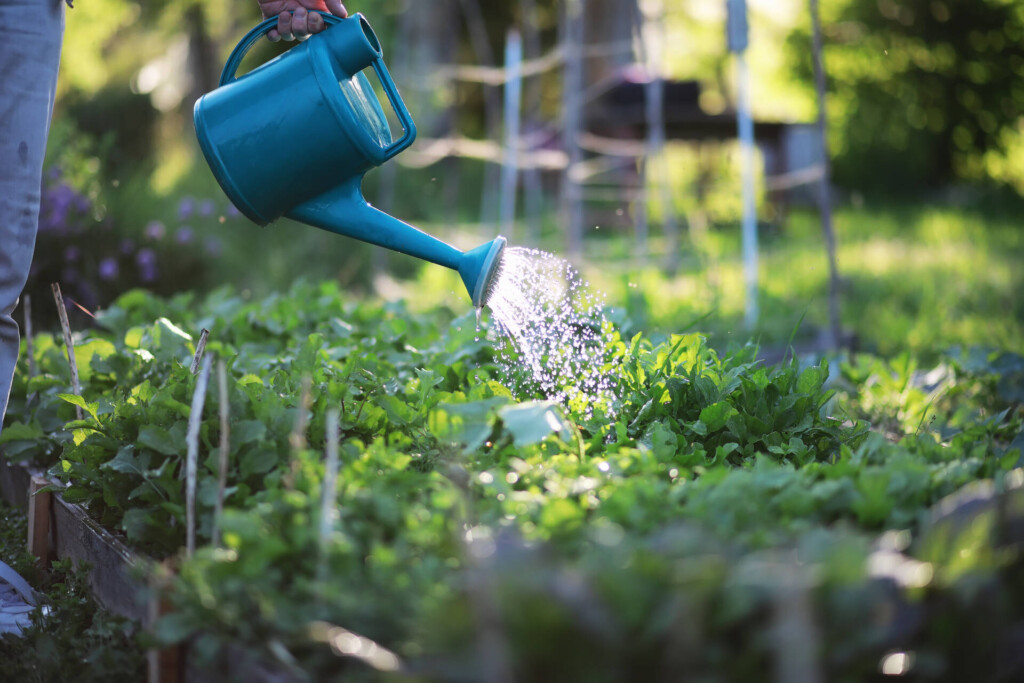
Regular watering is essential for a healthy garden. And you will know it is time to water when your plants begin to droop, or the top inch of soil is dry. In the heat of summer, thoroughly soak the soil. A soaker hose laid under your garden mulch is a low-maintenance way to distribute water gently and slowly. And drip irrigation kits are effective ways to evenly distribute water without having to hand-water the garden with a hose, which takes time.
Finally, regular weeding is essential for organic gardens because weeds fight your plants for nutrients from the soil. Stay on top of weeds by checking your garden at least once a week and clearing out these unwanted plants by hand. And, of course, do not use a traditional chemical spray to maintain your organic garden – just pull the weeds. You can water, pull weeds and check the garden for pests all at once.
Organic gardening takes a little more time and effort than traditional gardening. Checking the garden regularly, watering, pulling weeds and removing pests is essential. With a little more attention and the right soils, plants and pest controls, you will enjoy a thriving and productive garden that is healthy for you and the environment. Organic gardening can be a labor of love and well worth the investment!

